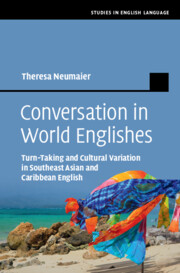 Conversation in World Englishes
Conversation in World Englishes Book contents
- Conversation in World Englishes
- Conversation in World Englishes
- Copyright page
- Dedication
- Contents
- Figures
- Tables
- Acknowledgements
- Abbreviations
- Transcription Conventions
- Chapter 1 Introduction
- Chapter 2 Investigating Talk-in-Interaction in Culture
- Chapter 3 Codifying Patterns of Interaction
- Chapter 4 Turn Allocation in Southeast Asian and Caribbean English Conversations: Forms, Contexts, and Frequencies
- Chapter 5 Turn-Claiming and Turn-Holding Resources in Southeast Asian and Caribbean English Conversations
- Chapter 6 Turn-Claiming and Turn-Holding: Strategy Clusters
- Chapter 7 Cooperation or Fights for the Floor?
- Chapter 8 Conclusion and Outlook
- References
- Index
Chapter 4 - Turn Allocation in Southeast Asian and Caribbean English Conversations: Forms, Contexts, and Frequencies
Published online by Cambridge University Press: 30 March 2023
- Conversation in World Englishes
- Conversation in World Englishes
- Copyright page
- Dedication
- Contents
- Figures
- Tables
- Acknowledgements
- Abbreviations
- Transcription Conventions
- Chapter 1 Introduction
- Chapter 2 Investigating Talk-in-Interaction in Culture
- Chapter 3 Codifying Patterns of Interaction
- Chapter 4 Turn Allocation in Southeast Asian and Caribbean English Conversations: Forms, Contexts, and Frequencies
- Chapter 5 Turn-Claiming and Turn-Holding Resources in Southeast Asian and Caribbean English Conversations
- Chapter 6 Turn-Claiming and Turn-Holding: Strategy Clusters
- Chapter 7 Cooperation or Fights for the Floor?
- Chapter 8 Conclusion and Outlook
- References
- Index
Summary
This chapter provides a detailed analysis of the different types and scenarios of speaker change in Southeast Asian and Caribbean conversations. The three general types of turn allocation – next speaker selection, self-selection, and current speaker continuation – and their concrete realisations in the data are examined both qualitatively and quantitatively. It can be shown that turn-taking in Southeast Asian and Caribbean English interactions is rule-governed and exhibits patterns similar to those that have been found in Inner Circle English conversations. Nevertheless, some differences between the speaker groups are found; for example, when it comes to how likely conversationalists are to yield the floor to a current speaker.
Keywords
- Type
- Chapter
- Information
- Conversation in World EnglishesTurn-Taking and Cultural Variation in Southeast Asian and Caribbean English, pp. 56 - 105Publisher: Cambridge University PressPrint publication year: 2023
